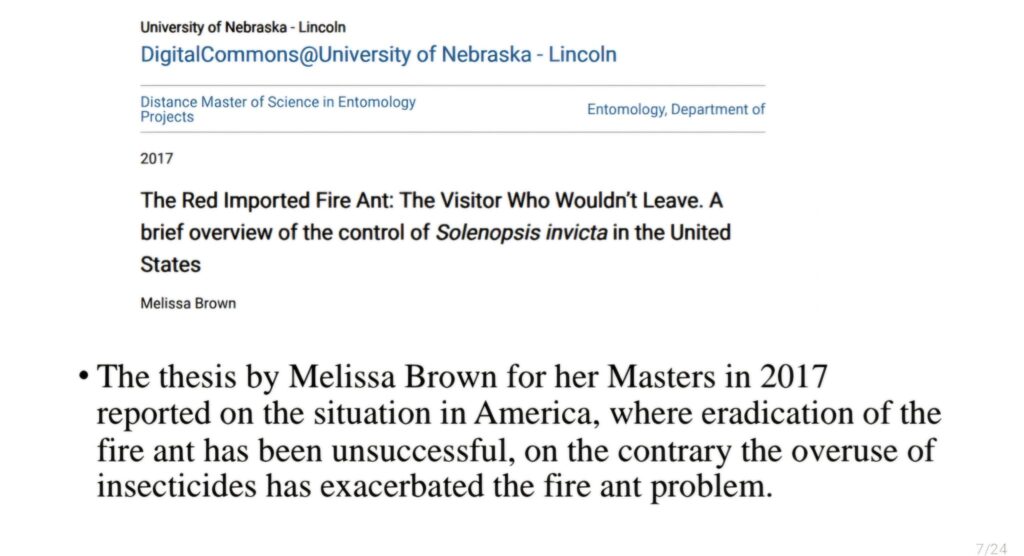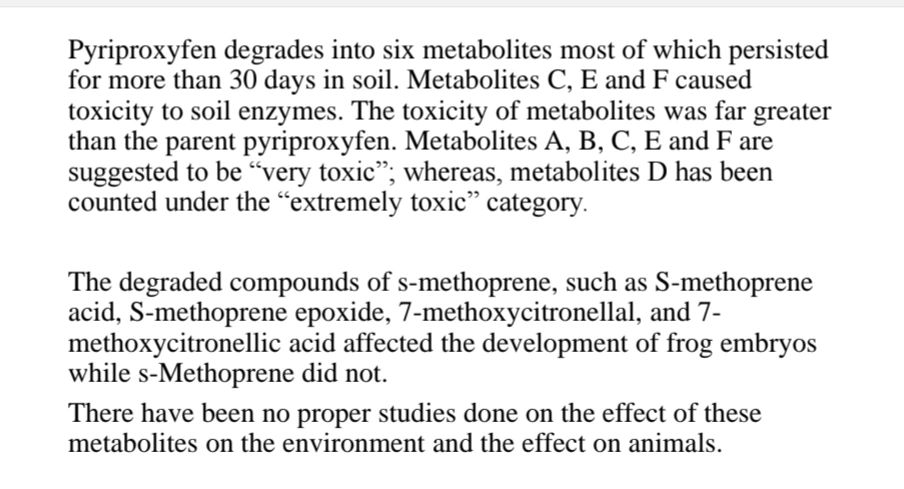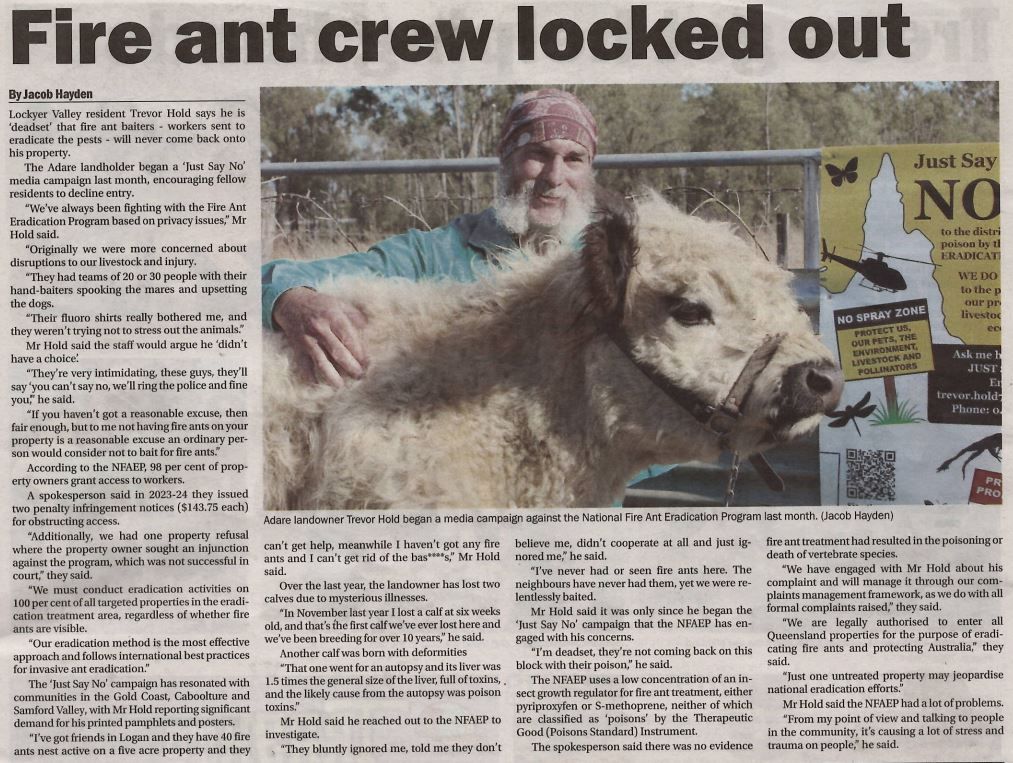Government poisoning program ignores deaths and injuries

Highly toxic chemicals are being sprayed on large areas in Queensland, including food growing areas, private property and this is being done by helicopter, drones and foot, on areas that do not have fire ants and multiple times a year. The poison has been found in waterways. Animals have died. People are reporting medical issues. Ecological and Health disaster unfolding under the pretense of fire ant eradication with pesticides bio-accumulating in the environment. Source of map: https://www.fireants.org.au/about-us/response-pl
In today’s interview with Trevor Hold who is on the ground, we discuss the misinformation being spread by the government about the safety and effectiveness of the program, that has already claimed the lives of two of his calves, who he had autopsied. He has gone through the bureaucratic procedures to report the deaths to the adverse reporting system and claim compensation for loss and come up against a brick wall and he produces the evidence of government complicity to ignore reporting of poisoning and continue spraying regardless of the consequences to human and animal health, environmental damage, damage to the ecosystem and pollution of the water ways.
The active ingredient in many fire ant baits, Pyriproxyfen, is classified as a pesticide and exhibits toxicity to insects as well as potential risks to other wildlife, aquatic species, and human health. According to the National Library of Medicine, “An official website of the United States government”, Pyriproxyfen is toxic to aquatic invertebrates and can cause long-lasting environmental harm. Beyond its environmental impact, further scientific evidence indicates that Pyriproxyfen may affect blood and liver health in humans. Exposure can result in anemia, impaired liver function, and tissue lesions. Additionally, Pyriproxyfen has been shown to exhibit estrogenic activity in human ovarian carcinoma cells, with endocrine-disrupting effects that could interfere with hormonal balance and reproductive health. The science is clear: Pyriproxyfen is a chemical agent designed to disrupt biological processes and kill pests, fitting the definition of a poison.
“Poison;
A substance that causes injury, illness, or death, especially by chemical means. Something destructive or fatal. A substance that inhibits another substance or a reaction.”
~ The American Heritage Dictionary of the English Language, 5th Edition
Public officials should prioritise educating themselves and being transparent about the nature of substances like Pyriproxyfen to ensure informed decision-making and community safety. Instead of dismissing legitimate concerns and accusing a growing group of over 8,000 concerned residents across SEQ (including petition signatories and online members), of spreading misinformation, it is essential to engage with and address these concerns based on a thorough understanding of the science.
Queensland Agriculture Minister Mark Furner was recently quoted in a news article as saying: “the science is clear and fire ant treatments are effective and safe. This group is spreading misinformation that fire ant bait is a poison – it is not.”
Furner’s assertion that fire ant bait is “not a poison” is misleading and disregards critical scientific evidence.
Why Trevor’s case is so important?
Trevor’s property has been sprayed since 2019, whereas most properties only started being sprayed towards the end of 2023, so he is seeing the first hand results of bio-accumulation of toxins. We discuss in the interview that the half life of the products being sprayed are unknown and that contrary to government propaganda, the chemicals are toxic to non-target species as well as fire ants, and are not designed to be sprayed indiscriminately. The spraying occurs 3 times a year and Trevor has managed to stop the spraying on his property but because his neighbours’ properties continue to be sprayed, his property is still being affected by the poisons. He has never had fire ants on his property. He really only connected the dots between his calves deaths and the ant baiting due to an article on Linkedin, and then reached out to other professionals and became a full time activist.
His experience with the Department that we have documented in this interview, is evidence of negligence and disregard for public safety. He has followed all the procedures to report harm, completed testing, autopsies, gathered data and the department has actually hindered his efforts and accused him of spreading misinformation in the media.
Public meetings have been held. Experts have spoken out. The government in response use studies that are decades old and their unscientific approach will cost lives and livelihoods. The approach of spraying large areas of land that do not have fire ants will kill native ant and insect species and provide an environment where fire ants then move in to infest without competition.
Biosecurity officers are threatening people with $15k fines for non compliance and telling them that they do not need consent to enter properties which is in fact not true. There must be a reasonable excuse to enter according to the law and we discuss this in the interview as well.
Workers are also being exposed to these harmful chemicals and are not properly attired and this is a breach of Work, Health and Safety regulations but part of the overall complacency of the program, that has convinced many people that there is nothing to fear, the government has their best interests at heart.
Trevor’s experience has been that when he asked the department to supply dates, and information regarding the spraying of his property, the department reacts in a hostile way, and supplies incomplete and misleading information and they are very reluctant to put information and orders in writing and be held accountable for their actions.
He has received anonymous online death threats for simply asking questions.
Community members subject to living under siege from helicopters, drones and ‘armies’ of people invading their properties to spray chemicals are in despair, feeling marginalized and even with no trespass signs and written opposition, if no-one is home, officers enter without consent and spray their properties anyway.
Ant Baiting Poisoning Program
Distance Ant Bait and Engage Ant Bait are non-specific to fire ants and are specifically formulated to attract over 5 native species of ants. They are also known to affect many other native insect species. The distribution of these chemicals in waters also creates negative impacts to aquatic life, including fish, crayfish, and muscles. There are also other non-target species which can be affected.
The APVMA (Australian Pesticides and Veterinary Medicines Authority) permit does not mean these adverse effects aren’t occurring or anticipated, merely that assessments made the (false) determination that these non-target affects are considered ‘reasonable’ if required to eradicate fire ants. The effects of Pyriproxyfen and s-Methoprene are dependent on the environment, whether conditions, specific circumstances and the susceptibility of animals (including humans) in the distribution zone.
Both these chemicals are harmful, to the point of causing death, to aquatic life with Distance Ant Bait (Pyriproxyfen) containing the following precautionary statements on the safety data sheet,
1. H412 Harmful to aquatic life with long lasting effects
2. P273 Avoid release to the environment and
3. P501 Dispose of contents/ container in accordance with national regulations. Engage (s-Methoprene) has a similar statement, R52/53 – Harmful to aquatic organisms, may cause long-term adverse effects in the aquatic environment.


Experts speaking out
Trevor Hold can be found
https://www.linkedin.com/in/trevor-hold-0576a657
Australian Advocacy Group, is a trading name of Hold Technologies (ABN 96 109 935 891) and is providing non-toxic hot water treatment fire ant management solutions.
This is a proven process, supported by scientific research and endorsed by patent holder Dr Joshua King. Reach out if you want to manage fire ants is a responsible, toxic free, way.
Phone Trevor 0401 517 906 or email trevor.hold79@gmail.com
Important Files

Call to Action
Queensland Citizens draws to the attention of the House that your petitioners grave concerns regarding the National Fire Ant Eradication Program (NFAEP) and request an urgent reassessment of its strategy, for the following reasons:
- We have concerns that the NFAEP has breached its obligations under the Environmental Protection Act 1994 by conducting the world’s largest eradication experiment in the absence of any Australian-based Environmental Risk Assessment.
- The effect of repeated broadscale application of pesticides (one unregistered and one under investigation) on the environment and humans remains unknown, it is impossible to assert that the risk of fire ants exceeds the environmental risk of repeated pesticide application.
- Despite 23 years and >$1b taxpayer dollars, net infestation has not been reduced by even one acre. Experts believe eradication is now impossible.
- The Biosecurity Act 2014 undermines property rights, permitting forced entry and application of toxic chemicals by the NFAEP onto private properties, increasingly causing distress and fear as the Program rolls out.
- This Program has no endpoint.
Your petitioners, therefore, request the House to:
In implementing the Biosecurity Act 2014, allow authorised officers to treat private properties only where a biosecurity threat is evidenced on the property whilst accommodating owners’ concerns.
Immediately pause the NFAEP.
Commission a comprehensive Environmental Risk Assessment on the effects of broadscale long-term use of fire ant baits on human and environmental health.
Shift from an ‘Eradication Program’ to a ‘Suppression Program’, focusing on restricting hazardous material movement to contain fire ant spread.
Sign the petition
Advocacy Groups
Stop Fire Ants Program on Facebook
https://www.facebook.com/groups/444909177952083
Mental health assistance